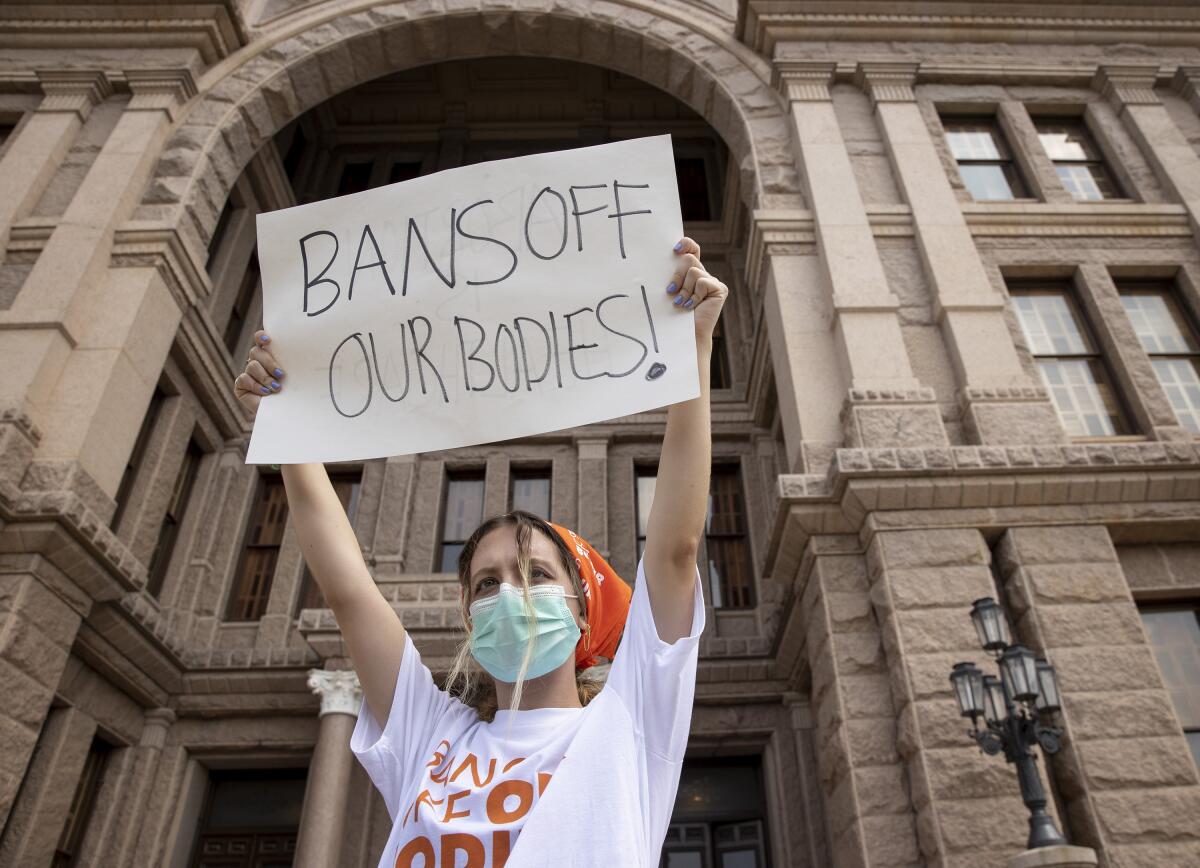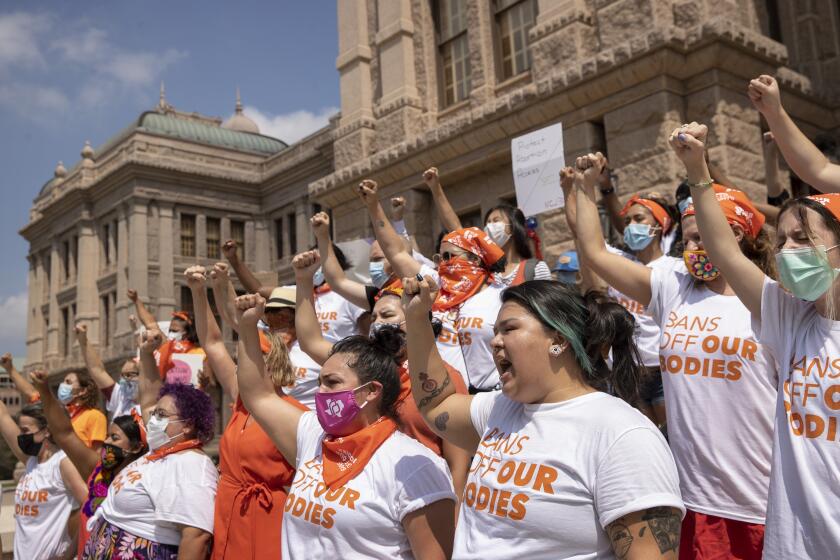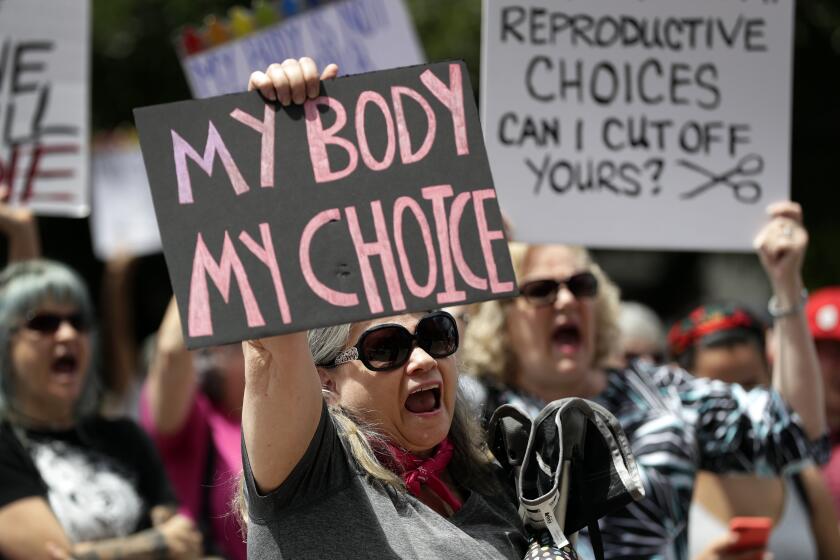Editorial: The Supreme Court has to save more than abortion access in Texas. It has to save itself

After twice refusing to block a blatantly unconstitutional Texas law that bans almost all abortions, the Supreme Court will hear arguments Monday on whether federal courts have the authority to strike down the law. The court could also decide, finally, to halt the law.
The court agreed to take two cases challenging the Texas law — one brought by the U.S. Department of Justice and the other by a group of abortion providers. In a rare move, the court also hyper fast-tracked the date for oral arguments — to just 10 days later. The court did not agree to decide the constitutionality of the law.
Even if the issues are narrow, that urgency from the court was desperately needed to deal with a law that has essentially made abortion unobtainable in Texas since Sept. 1. But it’s not only the fate of abortion access in Texas at risk. The legitimacy of the high court and the integrity of the U.S. Constitution are also at stake here. Is the Supreme Court really going to let a state ignore the Constitution with a diabolically novel enforcement scheme?
The Texas law, known as Senate Bill 8, bans abortion at six weeks of gestation (when most women don’t yet know they are pregnant). That clearly contradicts what the Supreme Court has affirmed and reaffirmed in various landmark cases, starting with Roe vs. Wade in 1973: Abortion is legal up to the point of the fetus’ viability outside the womb, which is about 24 weeks of gestation.
In light of the Texas abortion law, it’s time for the Women’s Health Protection Act, codifying the right to an abortion under Roe v. Wade, to pass Congress.
Senate Bill 8 was written specifically to subvert federal court review. When other states have passed laws banning abortion in early pregnancy, advocates and clinics challenge the law by suing state officials.
But the Texas law prohibits state officials from enforcing it. That means abortion providers challenging the law can’t name state officials in a federal lawsuit. Meanwhile, private citizens are deputized to enforce the law by suing anyone who helps a woman get an abortion — the doctor, a nurse, a ride-share driver, and so on. If that person who gets sued loses, he or she pays legal fees for the other side. If the person being sued wins — well, then he or she only has to pay their own legal fees. And the law prevents the person being sued from arguing simply that the law is unconstitutional — even though it is.
It sounds like something out of a legal horror story.
Except it’s not — and that should terrify every American. State governments have (unsuccessfully) fought the idea that they had to adhere to the tenets of the federal government and the Constitution — which they all ratified — since before the Civil War by passing laws or taking actions that contradicted federal laws. The Supreme Court has always rebuffed their attempts.
In one of the most famous cases, the Little Rock School District in Arkansas tried to delay integrating schools for 30 months in an end-run around the landmark Brown vs. Board of Education decision that segregating public schools is unconstitutional.
A law set to take effect Wednesday would outlaw abortions after a fetal heartbeat is detected. It’s unconstitutional and should be stopped.
In the landmark ruling, Cooper vs. Aaron, the court noted that it was “settled doctrine” that the court was the final interpreter of the Constitution, and school officials, as well as state government officials, couldn’t just disregard its rulings. The constitutional rights of children not to be discriminated against in school admission, as decided in the Brown case, “can neither be nullified openly and directly by state legislators or state executive or judicial officers nor nullified indirectly by them through evasive schemes for segregation,” the court said.
That sounds scarily like what Texas lawmakers are trying to do. As lawyers from the Center for Reproductive Rights and other advocates point out in their petition to the Supreme Court, the Texas law is nothing less than an attempt to nullify a federal right through an evasive scheme.
That makes it all the more troubling that the majority of the Supreme Court did not vote to block this law, at least temporarily, before it went into effect. Leaving the law in place raises the possibility that some justices really are the “partisan hacks” that Justice Amy Coney Barrett publicly sought to assure people they are not. Does anyone doubt that the court would have stopped a state law enacted after the Brown decision that authorized private citizens to sue anyone integrating a school?
It’s great that a U.S. District Court Judge temporarily blocked the Texas abortion ban, but the battle to get it struck down is just beginning.
Just one month after the Supreme Court hears arguments in the Texas cases, the court will hear a challenge to a 15-week abortion ban in Mississippi (also unconstitutional) — and possibly consider dismantling Roe vs. Wade, the seminal court decision that underlies the right to an abortion in the U.S. But for now, that decision still stands and should not be flouted.
It’s in the interest of all Americans and the Supreme Court itself that the court make clear that neither Texas nor any other state can nullify a constitutionally derived right.
More to Read
A cure for the common opinion
Get thought-provoking perspectives with our weekly newsletter.
You may occasionally receive promotional content from the Los Angeles Times.













